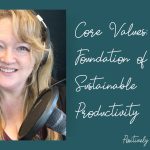The relentless pursuit of productivity has a dark side: the pervasive and false belief that our worth is directly tied to our output. Too many of us are trapped in this cycle, feeling intense guilt whenever we rest or worry that slowing down makes us “lazy.” This toxic belief system, relentlessly reinforced by hustle culture and outdated capitalist conditioning, is the most direct road to burnout and emotional exhaustion.
Today, I’m unpacking the sentiment that productivity isn’t always a good thing. As a productivity coach, I’ve dedicated myself to helping people work and live more efficiently and effectively. So, it might be a strange topic coming from me, but I’ve realized there is a dark side to this obsession. There is absolutely a time when productivity isn’t actually good for me, or for anyone else.
To be clear, productivity itself isn’t inherently bad or good. It’s a tool. The problem comes from the mindset that I and others attach to it.
I was reminded of this powerful distinction recently when I was a guest on another podcast. The host kept repeating a phrase that initially made me bristle: “Productivity is dangerous.” My immediate reaction was defensive. The way I approach productivity is supportive, compassionate, and freeing, the opposite of dangerous! But as she elaborated on her journey back from burnout, I realized she wasn’t attacking the concept of efficient work; she was reacting to the cultural conditioning that forced her to go beyond her limits in the name of being productive.
That’s the core issue I need to focus on today. I want to explore where this harmful mindset comes from, who I see it hurting the most, and, most importantly, how I can completely redefine productivity in a way that is truly good for me and the people I coach.
The Three Dangerous Mindset Traps I’ve Experienced
When I talk about productivity being dangerous, I’m really talking about the beliefs that transform a helpful tool into a punishing master. Somewhere along the way, productivity stopped being about systems and easy living and became the measure of my value. It became transactional, a principle I felt I had to adhere to at all costs, and I know from experience that this is a perfect recipe for burnout.
Let’s look at the three most common mindset traps that kept me pushing myself past the point of exhaustion:
1. Productivity as Worth
This is perhaps the most damaging trap I fell into. I was taught to believe that I was only as valuable as what I got done. If I was constantly achieving, checking boxes, and producing, I considered myself “good.” The minute I chose to rest, slow down, or fall behind, I suddenly labeled myself “lazy” or “not enough.”
This is a lie I had to unlearn. My worth as a human being has absolutely nothing to do with how many tasks I complete. Tying my self-esteem to my output created an insatiable, self-sabotaging loop where I could never truly be “done” or feel sufficient.
2. Productivity as Currency
In this mindset, everything became a transaction I had to earn. I felt I couldn’t rest unless I had finished all the work. I didn’t deserve joy, connection, or basic self-care unless I had proven myself first.
This is why I used to feel intense guilt when I finally took a break. I treated leisure time like a guilty pleasure I needed to “make up for,” and I had been deeply conditioned to think of rest as a reward instead of a right. This transactional view of my life kept me in a constant state of debt, always feeling like I owed the world more effort before I could cash in on a moment of peace.
3. Productivity as Identity
This trap hit me especially hard because I had tied my entire sense of self to my roles as a business owner and a coach. If I wasn’t acting like the “focused entrepreneur” or the “relentless achiever,” who was I? What was my value?
When my worth was tied to being a specific type of person who gets things done, slowing down felt like erasing my very identity. That sense of loss was terrifying, leading to an existential crisis of purpose and direction. I pushed on, not because the task mattered, but because I feared losing the “productive person” identity I had worked so hard to maintain.
These three traps were the engine behind my own perfectionism, people-pleasing, and chronic guilt. They were what kept me pushing beyond my limits, leading inevitably to nervous system dysregulation and burnout.
The Inherited Lie: Where I Believe This Mindset Comes From
To truly free myself, I had to look at the source of these insidious beliefs. They are not innate; they are inherited and built directly into the systems I live and work in.
I think about the foundations of our modern society. Capitalism fundamentally tied human value to output and profit. The Industrial Age measured everything by efficiency, speed, and how much could be produced in the shortest time possible. The message has been loud and clear for generations: our value is tied to our production capacity.
Culturally, we absorbed this with sayings like “time is money,” “do more with less,” and the simple, pervasive command to “do more.” We glorified the hustle. We admired the person who worked late, who boasted about their lack of sleep, and who never said no. This relentless pace was celebrated as a sign of strength when, in reality, it was a form of self-sacrifice that ultimately weakened us in the long term.
When productivity is defined this way, the corporate systems win. It is the individual who always loses in the long run.
To make matters worse, I see this system disproportionately harming those who are already challenged: caregivers balancing multiple demands, chronically ill or disabled individuals managing limited energy, neurodivergent folks trying to conform to rigid, traditional structures, and marginalized groups facing inequities. When productivity is defined by relentless, rigid output, those who cannot conform are unfairly labeled “failures.” I know they are not failing. The rigid, traditional productivity system is failing them.
Redefining Productivity: Shame-Free and Compassionate
This is where I flip the script. The tool of productivity is not the problem; the mindset and the oppressive systems I’ve attached to it are. It’s time for me to reclaim what’s good.
For me, productivity is simply a tool to help us do what matters most in a way that feels right and sustainable. It is not a measure of worth, a moral judgment, or a finish line we must cross to “earn” our place.
This is the heart of shame-free productivity. It’s an approach where I constantly ask myself:
- How can I create systems that support me, not punish me?
- How can I work with my energy, values, and goals instead of against them?
This looks like honoring my energy cycles instead of just pushing through exhaustion. It involves using flexible scheduling methods, or what I call “flex-blocking,” to create structure without rigidity. It means using a task triage to figure out what actually deserves my time, and creating a Joy List to intentionally weave fun and replenishment into my days.
Most importantly, it means aligning actions with values. At the end of the day, productivity should help us create a life that feels satisfying, enabling us to move toward what truly matters to us.
So, is productivity dangerous? No, not inherently. But the mindset I attach to it—the one that makes it a measure of my worth, a currency for rest, or the foundation of my identity—absolutely is. It becomes the very thing I need respite from, and it is never sustainable.
If you’ve ever felt like the pursuit of productivity wasn’t good for you, I want you to know it’s because you’ve been taught to ignore the most important element of personal productivity: you. I encourage you to let go of this inherited, damaging, and ineffective societal mindset. You have the power to create systems that support your real life, honor your actual energy, and bring joy back into the process.
I hope you’ll join me as I continue to redefine productivity, making it shame-free, compassionate, and personal, so it becomes a tool for living well instead of proof of whether or not I deserve to do so.











